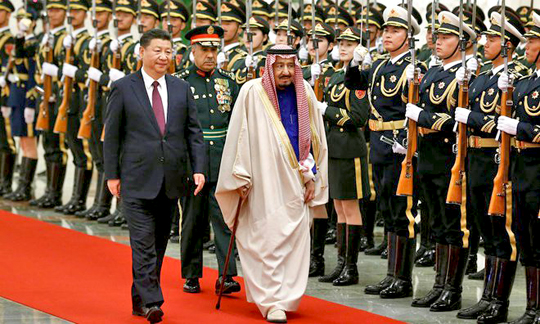Beijing, Mar 17: Chinese foreign affairs analysts say that a series of agreements signed by Saudi Arabia and China is a “win-win” situation for both countries.

Saudi Arabia’s King Salman oversaw the signing of deals worth potentially $65 billion on the first day of a visit to Beijing on Thursday, as the world’s largest oil exporter looks to cement ties with China.
Dr. Zeng Ji, chair of the Department of International Affairs at Sun Yat-sen University, China, told Arab News the deals consist of 35 projects that include covering productive capacity, trade, space industry, new energy and education.
“So far, I have noticed that little is mentioned about oil deals,” Zeng said. “It suggests that Sino-Saudi economic cooperation becomes more pluralistic nowadays, compared with China’s traditional reliance on Saudi oil. For China, the Middle East, including Saudi Arabia ... is not only a provider of energy. The paramount need for China is to export its over-abundant productive capacity.”
Zeng added the Middle East would accelerate China’s ambitious initiative aimed at tighter economic links with countries extending to Europe and Africa through the Middle East.
He also said the “deals suggest a win-win situation in the eyes of both countries.”
Dr. Degang Sun of the Institute of Shanghai International Studies University said China and Saudi Arabia are a perfect match in potential trade and investments.
“The two sides’ economies are supplementary to each other,” Degang told Arab News.
“In recent years, China put forward the ‘One Belt and One Road Initiative’ and the Saudi government put forward Vision 2030 in 2016. The two sides’ development strategies are compatible with each other. China perceives Saudi Arabia as the pivotal state in implementing its ‘One Belt and One Road,’ and China’s investment in and trade with Saudi Arabia will enhance the diversification and industrialization of the Saudi economy in the next decade.”
He said Saudi Arabia “looking east” and China “looking west” will enhance their strategic partnership.
Few other details were given about the 14 memoranda of understanding (MoU) that were signed on Thursday.
Besides the MoUs agreed between the two governments, Saudi and Chinese companies signed 21 deals, ranging from exploring investments in oil and petrochemical plants to e-commerce and co-operating in renewable energy markets.





Comments
Add new comment